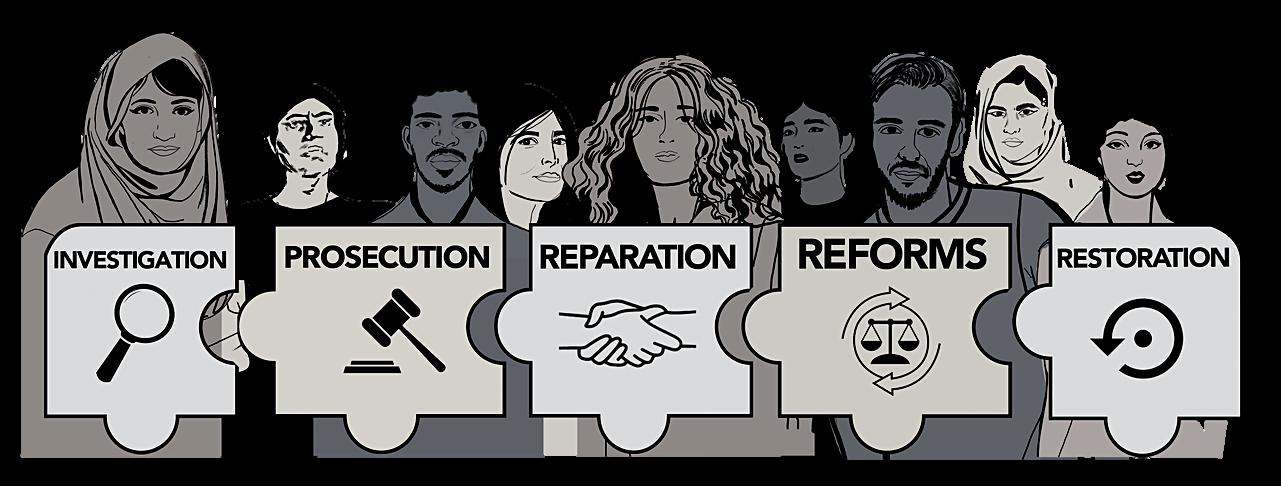

PROTECTING THE RIGHTS TO FREEDOM OF PEACEFUL ASSEMBLY AND ASSOCIATION THROUGH ACCOUNTABILITY STOP DO

Key recommendations to States to advance holistic victim-centered accountability
1. Stigmatisation and cease harmful, hostile narratives, encouraging and condoning violence against rights activists and protesters.
2 Abuse or misuse of ambiguous security laws (anti-terrorism, money laundering, cyber crimes) to criminalise activists and justify State abuses
3 Granting immunity or amnesty to law enforcement for using excessive force
4 Use of undercover law enforcement, use of militias, or armed groups in law enforcement operations targeting activists
5 Prosecuting activists and protesters for exercising their rights
1. Promptly and publicly condemn from the highest State level abuses against activists, civil society and protesters:
-Publicly recognize the crimes and take action to bring those responsible to account.
3. Effectively Investigate and Prosecute:
-Ensure prompt, effective and independent investigations, and bring perpetrators, including those with command responsibility to account;
- Ensure that officials and commanding officers are held accountable, irrespective of their status and authority, for crimes committed by their subordinates amounting to international crimes;
6. The ongoing impunity and cycle of repetition of violence and repression against activists and protesters.
7. Re-traumatisation and revictimization of activists and protesters including from minority groups, women, children, LGBTQI+.
8. Stop reprisals against victims and accountability-seeking activists.


-Set up, well-resourced civilian oversight bodies, trained in human rights investigations, including in the context of protests, with a mandate to investigate law enforcement officers;
-Ensure that investigatory mechanisms are promptly established, with a mandate not only to focus on individual cases but also to identify patterns and practices of violations and the wider context in which they take place, as well as the root causes, considering social, political, historical and other relevant factors.
4. Strengthen chain of command, recordkeeping and reporting:
- Develop clear, unambiguous and transparent lines of command and implement proper record-keeping related to the decisions and orders made by commanding officers at all levels.

5. Repair harm and restore dignity and fundamental freedoms rights :
- Implement both individual and communal reparation measures and programmes that meet the differentiated and specific needs of every victim group. Such programmes should include restitution, compensation, rehabilitation and satisfaction for all affected victims or their families, according to their needs and relative to the harm inflicted and should be set up in consultation with victims, ensuring that they are gender-sensitive and considerate of additional vulnerabilities related to the race, ethnic, religious or indigenous background, social or migration status, sexuality, age or disability of the victims
6 Initiate legal and institutional reforms: -Adopt appropriate legal, institutional and policy measures, including security sector reforms, with the aim of ensuring that there is no repetition of violations;
- Address root causes including structured discrimination and restrictions which contributed to repression of activists and protesters



7. Ensure that law enforcement agents, lawyers, the judiciary and other court personnel receive training and guidance in dealing with cases of sexual and genderbased violence, and in cases where children are victims/survivors of serious abuse in the context of exercising the rights to freedom of peaceful assembly and association;
-Provide children whose rights have potentially been violated in connection with their activism with timely and childfriendly access to effective remedies adapted to their needs, including through judicial remedies;.
8. Ensure, facilitate and protect victims’ participation in accountability processes –from design to implementation.
RADICAL CANDOR
The international community should respond promptly and pre-emptively to close the accountability gap by:
1. Imposing travel bans and asset freezes on individual perpetrators responsible for the commission of serious crimes against activists and in the context of protests;
2. Arresting, and trying or extraditing persons alleged to have ordered or committed international crimes related to assembly and association rights;
3. Effectively implementing all relevant judgments of regional and international judicial bodies adequately and in a timely manner;
Just like most print publications, the key to creating an effective booklet lies in curation. Consistency in branding is important for businesses, but good design also applies to personal or event booklets. Make sure you have clear, accurate information on each page. Choose compelling photos, fonts, and images. Pick colors that suit your style. You need to communicate well with your audience, so always keep them in mind as you design.
4. Supporting through the UN mechanisms and/or regional bodies, the prompt establishment or implementation of:
Whether you're creating a compilation of your recipes or showcasing your latest promotions, just create a good balance of content and you're on your way to a clear, effective booklet
i. Independent international commissions of inquiry, mandated to document and investigate the crimes and their root causes and prepare submit cases on alleged perpetrators to national and international justice mechanisms, including the ICC;
ii. Specialized tribunals, as and where necessary;
iii The principle of universal jurisdiction to prosecute perpetrators of serious crimes caried out against activists and in the context of protests.




Watch all testimonies
